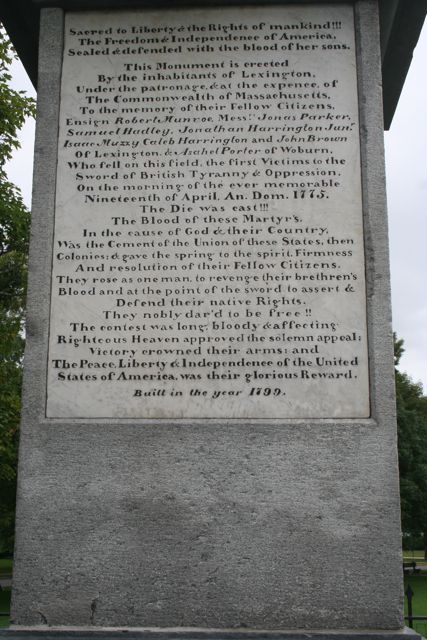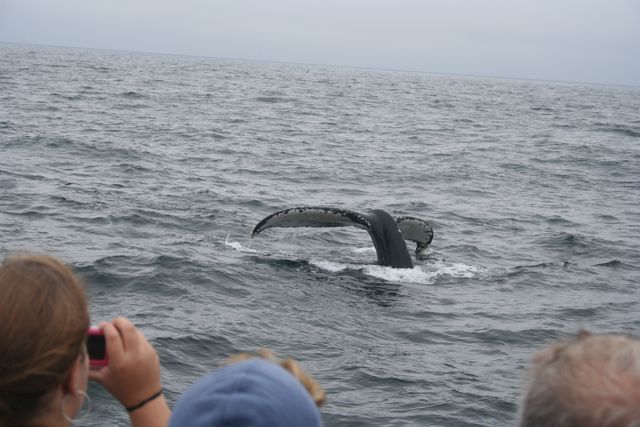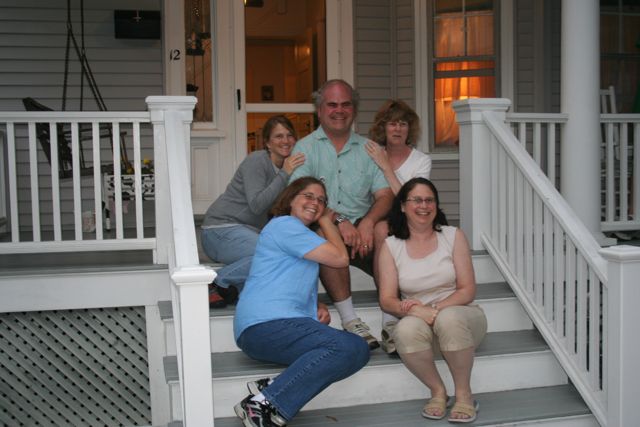We’re on vacation this week up in Massachusetts. Salem, on the north shore, is my mother’s home town, though she hasn’t lived there in years. I lived there myself for three years back in middle school. So between family visits and memories of those days (ah, middle school – such a font of fond remembrances), I’ve got a lot of memories of Salem.
We’re not staying in Salem, but rather in nearby Gloucester. In a beautiful and large house overlooking the water, we’re up here with all of my kids, my mother, and my sister and her family. Gloucester is about half an hour’s drive north of Salem, fairly close to the northern edge of Massachusetts. See your favorite mapping program if you really want more details.
Today, our first full day up here, Julie and I went with the kids to Salem.
Back in the day, Salem was a typical small city. Lots of houses of various sorts with a suburban feel to them, an active downtown, and a few tourist attractions, which in Salem’s case included a mix of sites celebrating Salem’s history as a center of the China trade, the fact that Salem was the hometown of author Nathaniel Hawthorne (The House of the Seven Gables, one of his novels, is set in colonial Salem, and in fact you can still visit the house in question), and, of course, the witch trials.
Salem has always made a big deal of the witch trials. The Witch City, they call it, and a witch on a broomstick is the symbol of the city. Somewhat in poor taste, I’ve always thought: given what happened to those accused in that horrible summer of 1692 (and none of the twenty who were executed were in any way, shape, or form witches, though one of the women jailed for witchcraft and later released did try to cast a few charms (unsuccessfully, of course)), having Salem call itself the Witch City feels to me rather as if Auschwitz, Poland, called itself the Jew City.
When I lived here, there were a few tourist attractions related to the witch trials. There was the Witch House, which was the house in which some of the judges lived during the trials – a real historical site with real historical artifacts. There was the Witch Museum, a wax museum with several tableaux that accurately told the story of the witch trials (my favorite scene as a child was always the large wax Satan). But that, really, was about it. Oh, some of the history lived on in some of the names of parts of town. Gallows Hill, for instance: the prominent hill where the executions took place was now the town’s high rent district. But Salem, except for the witches painted on the side of every police car, was fairly decorous about its use of its past.
But then came the shopping malls and Walmarts. They did to Salem’s downtown what they did to pretty much every small city’s downtown: they killed it dead. None of the stores that I remember from my childhood – not Almy’s, not Daniel Lowes, none of the others – still exist in downtown Salem. In modern America, you just don’t go to a small downtown to do your shopping. Oh, the big cities still have thriving retail centers. But outside of the big cities, you go to the malls or the giant discount stores that live in the edge cities, and the idea of a small town commercial center is a quaint little bit of American history.
So what is a town like Salem going to do? What’s going to fill those retail establishments? What kind of stores will thrive in that nicely bricked-over five blocks of downtown, a true town-center, not just a shopping mall by other name?
In Salem’s case, the downtown that died has risen from the grave and become a center of cheesy tourist traps. Perhaps appropriately, the dead now walk the earth where Salem’s commercial heart used to beat. Salem, from the costume shops to the month-long Halloween celebration every fall, is capitalizing on the darkest moments of its history.
Today we were in search of cheesy entertainment. So it was off to downtown Salem. We visited a couple of witchcraft stores (no eye of newt on sale, but plenty of witchy-costume pieces and a number of small bags of aromatic herbs sitting between a shelf of tarot decks and crystal balls and a rack of t-shirts). Amusing, but we were out for more dramatic entertainments. And so in a two hour period, and all within a short walk of the center of Salem, we visited:
* The Nightmare Factory, a haunted house complete with 3D glasses and special effects;
* Dracula’s Castle, a haunted house hosted by a guy wearing a black cape and oozing fake blood;
* The Witch Village, a wax museum focusing on the history of witches;
* Frankenstein’s Laboratory, yet another haunted house, can you guess the theme?
* The Witch Trials Memorial, a wax museum about the Salem witch trials;
* Count Orlok’s Nightmare Gallery, a wax museum of movie monsters (Julie, who grew up on the classic horror movies, really liked this one).
That’s got to be more cheesy tourist attractions than you can find in any other half-dozen small-towns in America. And that’s not including the ones we skipped, such as the 40 Whacks Museum (a museum of Lizzie Borden, the OJ of her day, a 19th century Massachusetts woman who probably did kill her parents with that ax, though she was acquitted), the Witch History Museum (not to be confused with the Witch Museum that we also skipped), the Pirate Museum, and probably a bunch of others that I’m forgetting.
Oh, there’s many legitimate tourist attractions in Salem. There’s Derby Wharf, where much of the trading was done. There’s the House of the Seven Gables that I mentioned earlier. There’s the Peabody Museum, a remarkable collection of things brought back by the China traders, there’s Pioneer Village, which shows how the original settlers lived (and Salem was settled just six years after Plymouth, so we’re talking early days for this country). And there’s others.
But honestly, we had a grand time visiting all of the cheesy attractions. If you enjoy cheesy wax museums, if you like wandering through a darkened labyrinth while guys in costume jump out and go Boo, then you probably can’t beat Salem.
But it is sad to see what has happened to the small American city.
A postscript: we finished our day in Salem at the Salem Willows. The Willows has a small boardwalk and an even smaller beach, a couple of rides, three arcades, some pleasant paths over grassy hills, and rather excellent flavored popcorn bars and salt water taffy. There’s also a bandstand where they hold the occasional summer concert. If you want to go somewhere that feels a lot like small-town scenes from movies of the twenties and thirties, the Willows will suit you well.
So perhaps not everything about small town America is dead after all.
Post-postscript: I vaguely recall giving my Salem rant before, and even have diffuse memories of writing it down. I may have blogged about it five years ago when we last visited here. If so, it’s not surprising: I’ve had these thoughts for years. But apologies for repeating myself.
And Salem has gotten cheesier in those five years. While even then there were more wax museums per capita than anywhere else I’ve visited, the numbers have grown in the intervening years.




